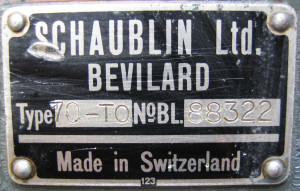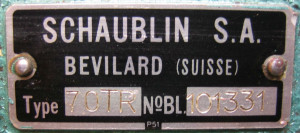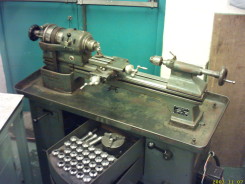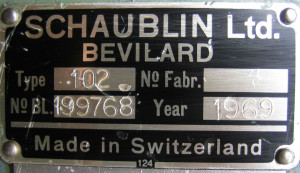Name plates and machine markings: In addition to the cast-in script with the company name (see Schaublin index page for history of the name changes), Schaublin fitted a number of name plates over the years. Below are the ones I’m aware of and the dates associated with them via the BL numbers.
 |
Plate dating from circa 1955 fitted to a Schaublin 70 at the left-hand end of the bed. These plates seem to have been used on the Schaublin 70 from the mid 1950s and through the 1960s. They may have been for the UK or anglophone countries only. |
 |
Plate dating from circa 1957 fitted to a Schaublin 70 at the left-hand end of the bed. |
 |
This plate appears to date from 1963. It was attached to the left end of a Schaublin 70 bed. These plates appear to have been used throughout the 1960s on machines sold into Switzerland and continental Europe. |
|
|
Plate dating from 1969 – these plates were fitted to cabinet mounted Schaublin lathes and milling machines from the early 1950s through to 1969. These are obviously the most useful in dating a machine since they state the year of manufacture! This is the latest use of this plate that I’m aware of. Again these may have been specific to the UK or anglophone countries, although this particular machine was imported to the UK from the Netherlands. |
|
|
This is the last type of identification plate used by Schaublin. The earliest example I have dates from 1970, but I believe they were used from around 1968 on some machines. They are still in use today. |
BL numbers: The machine build number will give you an exact date for your machine. However, with over 100,000 Schaublin 70 and 102 machines I do not have comprehensive records – Schaublin Machines SA of course do. I do have records for other Schaublin machines and the following chart will give a indication of when your machine was built by half decade. However, it should be noted that BL numbers are not strictly consecutive and your machine may fall either side of the divisions below.
| Years | BL number range (approx) |
| 1945 – 1950 | 44500 – 60500 |
| 1950 – 1955 | 60500 – 80000 |
| 1955 – 1960 | 80000 – 117000 |
| 1960 – 1965 | 11700 – 145000 |
| 1965 – 1970 | 145000 – 198000 |
| 1970 – 1975 | 198000 – 264000 |
| 1975 – 1980 | 264000 – 289000 |
| 1980 – 1985 | 289000 – 308500 |
| 1985 – 1990 | 308500 – 322600 |
| 1990 – 1995 | 322600 – 333000 |
| 1995 – 2000 | 333000 – 341700 |
Paint codes: Based on over twenty years experience and research, as far as I am aware Schaublin machines have been painted in the following colours:
 |
Black | Pre WW2 |
 |
Green-grey. Unfortunately, I don’t have an exact specification for this colour. RAL 7012 is quite close but I’ve recently been advised by a Swiss contact that NCS S B7005-80G is a much better match.
|
Late 1930s – early 1960s |
 |
Blue-grey DIN 37020 – almost identical to RAL 7031
|
Early 1960s – late 1990s |
 |
Green – RAL 6011
|
1980s – late 1990s |
 |
Light-blue NCS 1020-R80B (machine), RAL 5012 (benches), NCS 3030-R90B (cast iron cabinets). | Colours from around 2000 |
From the 1980s onwards paint finishes were textured (firstly on cabinets and then on all machine components) and a choice of blue-grey or green were available as standard finishes (however, it appears green was the default option).
If anyone has any further colour codes/schemes I’d be pleased to hear from them. It should be remembered that even if you have the exact paint code for your machine, new paint will look a different shade to the original finish due to fading over time, oil staining etc.



